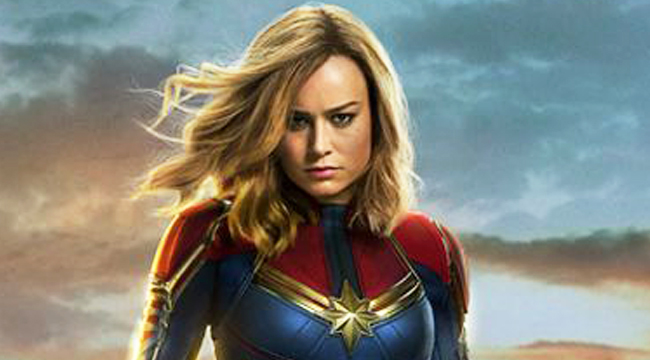
A few weeks ago, critics who screened Captain Marvel were permitted to tweet brief reactions to the movie, and the consensus was that “Thanos is f*cked.” Well, Tuesday saw the release of full-on reviews, and that sentiment still appears to stand. The more fleshed-out medium, obviously, allows for more nuanced takes, and Rotten Tomatoes is currently reflecting an 89% “fresh” rating after 73 reviews. That’s not unanimously positive, but it’s solid. That’s a word that comes up in several reviews, including USA Today‘s Brian Truitt calling the movie “a solid foundation” to wherever the MCU and Carol Danvers soar next. The Atlantic’s David Sims describes the flick as “more of a solid building block for future endeavors than a must-see solo adventure.”
While critics don’t appear to be in love with the film’s entire execution, they’re overwhelmingly saying that directors Anna Boden and Ryan Fleck produced a blast of an experience. UPROXX’s Mike Ryan pointed toward the film being an origin story that avoids the pitfalls of the format and makes it clear that Carol Danvers “is going to be one of the anchors” of future MCU adventures. Ryan also praised lead actress Brie Larson and Ben Mendelsohn (who plays Skrull leader Talos) while pointing toward the movie’s delightful weirdness:
The advertising for this movie doesn’t quite let on (a) how weird Captain Marvel actually is and (b) that this movie is pretty much a full-on cosmic sci-fi film. I’m going to take a guess that it’s not going to be what most people are expecting. And, for the record, the surprise delighted me … Yes, Captain Marvel is an origin story, but it’s handled in such a unique way that it doesn’t always feel like an origin story. With rumors of movies based on The Eternals out there, Captain Marvel also feels like the first big step to an even more cosmic MCU.
Elsewhere, critics are singling out Carol Danvers as a badass who’s pulling off her own type of origin story. From the Seattle Times‘ Moira Macdonald:
Like its tough, smart heroine, Captain Marvel dances to its own beat; it’s an origin story that isn’t structured as an origin story but gets there all the same.
Bleeding Cool’s Kaitlyn Booth points toward the complex badassery at hand:
Star Brie Larson reminds everyone that she won an Academy Award for a reason and her Carol Danvers is empathetic, badass, and so perfectly flawed. We so rarely get to see women make mistakes or be snarky, but there Carol is on screen doing her best and still messing up.
/Film’s Hoai-Tran Bui similarly high-fives Larson’s multidimensional hero:
Much hoopla has been made about Carol being an unsympathetic character, that’s not the case at all. Larson imbues her with an edge, for sure, but Carol is vulnerable and sarcastic, and — as seems to be in the contract with every Marvel superhero — she’s quippy. As she unravels, Larson effortlessly displays the full range of emotions of a woman grappling with her own identity and self-worth.
The Mary Sue’s Kate Gardner praises Carol Danvers as a flat-out hero and adds that whether she’s male or female doesn’t matter at all:
Carol is fierce and funny and represents a movement of women who are, as Carol says in another trailer, tired of being told what they can’t do. She gets up and keeps on fighting, letting her power flow through her. Carol gets to be a fully realized character. She is the beating heart of the film, and she gets to be her own hero. There is no last-minute saving of the day by a male character. Carol is not defined by men, or by gendered trauma. She is simply a hero.
NPR’s Glen Weldon checks off the Bechdel test criteria:
“[T]hey’ve carefully crafted the film to supply at least some young women with the kind of onscreen, butt-kicking, name-taking proxy young boys have enjoyed for decades. It outfits our hero not with a blandly handsome male romantic partner, but with a supportive, badass female friend (Lashana Lynch) with whom to ace the Bechdel test like they swiped the answer key.
Variety‘s Owen Gleiberman drives deeply at how the necessarily changed-up origin story format makes for an engrossing journey:
She needs to open herself up to a bold new mode, and the film uses that transition as an analogue of her existence as a female superhero. Everything she’s been told is wrong! Can she wake up from the oppressive (read: patriarchal) mind-set of the conventions that bind her? Captain Marvel is only the second Hollywood movie to feature a female superhero at its center, but it’s a savvier and more high-flying fantasy than Wonder Woman, because it’s the origin story as head game. Larson’s Vers is like someone trapped in a matrix — she has to shake off the dream of who she is to locate the superwoman she could be. And that makes for a rouser of a journey.
And Refinery 29’s Anne Cohen aligns Danvers with some cinematic greats while drawing a parallel to Wonder Woman’s experience:
Larson carries a difficult role with a grin and a swagger that matches Tom Cruise’s in Top Gun. She’s perfectly cast in this nod to the ’80s and ’90s — and would make a great pairing with Ripley (Sigourney Weaver) from Alien and Sarah Connor (Linda Hamilton) in the Terminator franchise. But her confidence is especially striking in that it does feel so alien. Like Wonder Woman (and this is the only comparison you’ll get from me), she’s an outsider who doesn’t feel burdened by the constraints of normal women — she doesn’t even know to be concerned with them.
Captain Marvel arrives in theaters on March 8.
